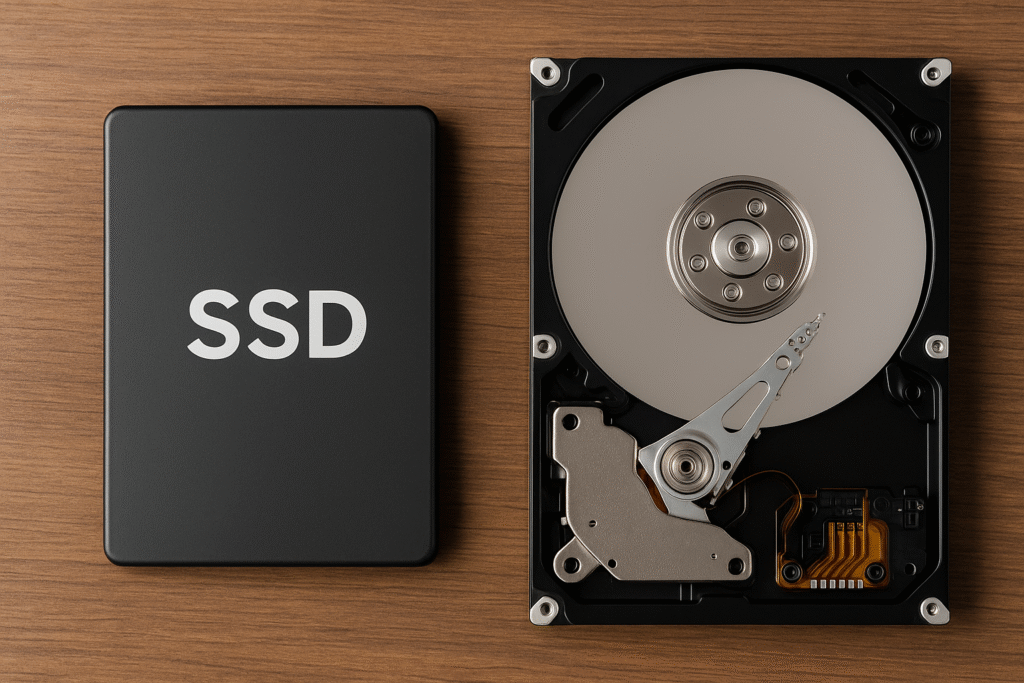In the ever-evolving world of technology, storage devices play a crucial role in how computers and digital systems function. For decades, the Hard Disk Drive (HDD) was the standard for storing data in desktops, laptops, and servers. But over the last several years, a new player—Solid State Drive (SSD)—has taken the spotlight.
If you’ve ever wondered why SSDs are touted as a major upgrade, or whether it’s time to make the switch, this article will give you a clear, comprehensive explanation. We’ll compare SSDs and HDDs in speed, durability, power consumption, price, and overall performance to help you decide what’s best for your needs.
What Is an HDD (Hard Disk Drive)?
A Hard Disk Drive is a mechanical storage device that uses spinning magnetic disks (called platters) to read and write data. It has moving parts, including:
- A spinning disk to store data
- A read/write arm that moves across the disk to access information
This mechanical nature is both a strength (in terms of affordability) and a weakness (due to fragility and slower speeds).
Key Features of HDDs:
- Capacities range from 500GB to several terabytes (TB)
- Slower read/write speeds
- More affordable per GB
- Susceptible to physical damage due to moving parts
What Is an SSD (Solid State Drive)?
An SSD stores data using flash memory, with no moving parts. Instead of spinning disks and arms, SSDs use microchips that instantly access stored information. This makes them faster, more reliable, and more energy-efficient than traditional HDDs.
Key Features of SSDs:
- Instant access to data
- Much faster speeds
- Silent operation
- Durability against shock and drops
- Typically more expensive per GB than HDDs
SSDs are commonly found in modern laptops, smartphones, gaming consoles, and even enterprise-grade servers.
SSD vs. HDD: Head-to-Head Comparison
Let’s break down the major differences between SSDs and HDDs:
1. Speed
- SSD: Boots up an operating system in seconds. Transfers large files in seconds.
- HDD: Slower boot times (can take up to a minute). File transfers can lag, especially under pressure.
💡 Verdict: SSDs are up to 10x faster in read/write operations.
2. Durability
- SSD: No moving parts = more resistance to shock and drops.
- HDD: Fragile components that can be damaged by movement or vibration.
💡 Verdict: SSDs are more reliable for laptops and mobile setups.
3. Noise
- SSD: Completely silent.
- HDD: Mechanical spinning and clicking noises.
💡 Verdict: SSD wins again, especially in noise-sensitive environments.
4. Power Consumption
- SSD: Uses less electricity—great for laptops and energy savings.
- HDD: Consumes more power due to mechanical components.
💡 Verdict: SSDs are more efficient and battery-friendly.
5. Storage Capacity
- HDD: Available in much larger sizes (up to 20TB).
- SSD: Sizes typically max out at 4TB for consumer use (with higher enterprise options).
💡 Verdict: HDDs offer more capacity for less money, ideal for massive storage needs.
6. Lifespan and Wear
- SSD: Limited by write cycles but still lasts for many years with normal use.
- HDD: Moving parts wear out over time.
💡 Verdict: Both have finite lifespans, but SSDs tend to remain more stable over time.
7. Price
- SSD: More expensive per gigabyte.
- HDD: Significantly cheaper for large storage.
💡 Verdict: HDDs are better if you need tons of storage on a budget.
Why SSDs Are Better for Everyday Users
While HDDs may still be useful for backup drives and bulk storage, SSDs are the smarter choice for daily use, especially in laptops and desktops. Here’s why:
Faster Boot and Load Times
An SSD can reduce boot times from a full minute to under 10 seconds. Applications like Chrome, Photoshop, or even your file explorer open almost instantly.
Better Multitasking
Switching between tabs, launching software, and moving files all feel smoother and faster with SSDs.
Lightweight and Shock-Resistant
For laptops or external drives that travel with you, the resilience of SSDs makes them a safer choice.
Long-Term Reliability
SSDs may have a limited write cycle, but under typical usage, they can last 5–10 years or more without issue.
When an HDD Might Still Be the Right Choice
While SSDs dominate in speed and performance, HDDs still have a few advantages, especially for:
- Media storage: Storing movies, music, and photos
- Backups: Large, infrequently accessed archives
- Budget builds: Where affordability is more important than speed
- Network-attached storage (NAS): Bulk data storage in servers
Many users opt for a hybrid approach—an SSD for the operating system and essential programs, and an HDD for additional storage.
Types of SSDs
Not all SSDs are the same. Here are the most common types:
1. SATA SSD
- Uses the same interface as HDDs
- Slower than other SSD types, but still much faster than HDDs
- Good for older systems or budget builds
2. NVMe (M.2) SSD
- Connects directly to the motherboard
- Uses PCIe interface for blazing speeds
- Compact and efficient
- Best for gaming, video editing, and high-performance tasks
3. External SSD
- Connects via USB-C or Thunderbolt
- Great for transferring large files or expanding storage
- Durable and portable
Tips When Upgrading to an SSD
If you’re switching from an HDD to an SSD, keep these tips in mind:
- Check Compatibility: Make sure your motherboard supports the SSD form factor (e.g., SATA, M.2).
- Clone Your Drive: Use tools like Macrium Reflect or Clonezilla to transfer your data.
- Fresh Install: For the best performance, consider reinstalling your OS instead of cloning.
- Don’t Fill It Up: Keep at least 10–20% of your SSD free to ensure optimal performance.
SSDs in 2025: Are They Worth It?
Absolutely. Prices have dropped significantly over the years, and even budget laptops now ship with SSDs as standard. If you haven’t made the switch yet, now is the time. The performance boost is noticeable and well worth the investment.
Final Thoughts: SSD vs. HDD — The Verdict
| Feature | SSD | HDD |
|---|---|---|
| Speed | 🏆 Super Fast | ❌ Slower |
| Durability | 🏆 More Reliable | ❌ Fragile |
| Noise | 🏆 Silent | ❌ Noisy |
| Power Usage | 🏆 Energy Efficient | ❌ Power Hungry |
| Storage Size | ❌ Smaller (up to 4TB) | 🏆 Larger (up to 20TB) |
| Price | ❌ More Expensive | 🏆 Affordable |
If you prioritize speed, durability, and efficiency, an SSD is clearly the better choice. For large storage on a tight budget, HDDs still serve a purpose.
But in most modern use cases, SSDs offer the best balance of performance and reliability, making them the top recommendation for anyone upgrading their computer or buying a new one.

